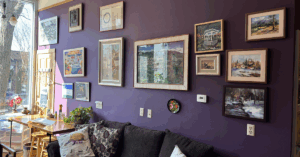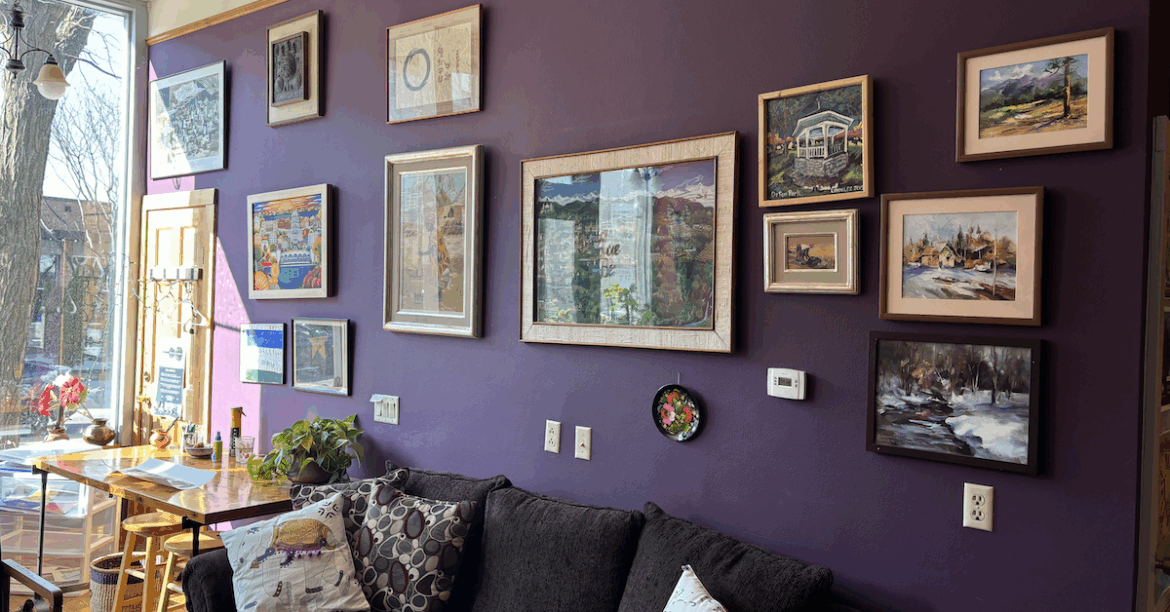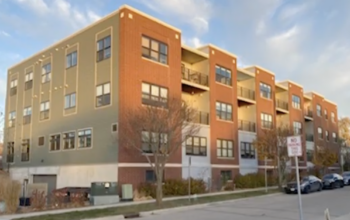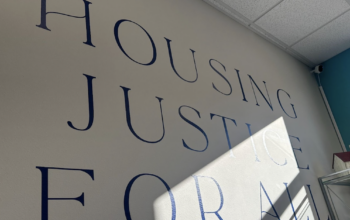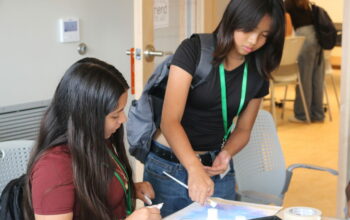On the first Monday evening of every month, at 911 Williamson Street, a group sips tea, eats cookies and settles on the comfortable couches and chairs to calmly discuss the inescapable reality of death.
Death Cafe is an international nonprofit social franchise that began in East London in 2011. Today, 20,638 Death Cafes are held in libraries, cafes, houses and learning centers across Europe, North America, Asia and Australia, according to the Death Cafe website. The Madison Death Cafe began in June 2015 and meets at A Place To Be, a community learning space for creative and progressive groups and others to meet and converse. The monthly Monday meetings run from 6:30–8 p.m., usually consisting of between 10 and 15 people, age thirty and up.
“A Death Cafe is a group-directed discussion of death with no agenda, objectives or themes. It is a discussion group rather than a grief support or counselling session,” according to Death Cafe. “Our aim is to increase awareness of death to help people make the most of their (finite) lives.”
Per official guidelines, the Death Cafe is not a support group or a form of group therapy, but an informal, confidential, organic space to learn, listen and laugh. The conversations can focus on anything related to death and dying, including preparing for death, death in other cultures, funerals, burials, the afterlife, death-related media, supporting others and the brute reality of loss.
According to Therese Morrissey, a licensed clinical social worker and the Madison Death Cafe’s co-founder and discussion moderator, nothing is off-limits in the monthly conversations, and discussions can focus on anything, including the fear of death and aging and feeling obsolete.
“The issue is there is so little conversation that happens on this subject,” said Dr. Jatinder Cheema, who owns A Place To Be.
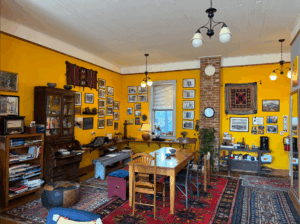
In 2009, Cheema, as she prefers to be called, purchased the community space after she retired and moved to Madison in 2008, after working as a senior foreign service officer at the United States Agency for National Development. In 2011, Cheema opened A Place to Be for conversations, meetings, art and music exhibitions, readings, lectures, workshops, and her own writing workplace.
“I saw a for sale sign here and I called my real estate person. I said, ‘I want this place. This feels like I have to have it,’” Cheema said. “There was some connection with this place, I felt. I loved the building, and I knew I wanted to do something, I didn’t quite know what,” she added.
The teal green building is a physical representation of Cheema’s life. With bright, color-blocked walls of yellow, deep purple and red, each wall represented a part of Cheema’s life. One wall is dedicated to her family and friends’ artwork, another wall is dedicated to her photographs and another corner holds her work-related certificates and notes of accomplishment, as well as her writing desk. A coffee and tea table holds an eclectic collection of mugs, while overlapping red rugs and plush seating fill the space.
“I wanted this place to represent me,” Cheema said.
Morrissey said that she also felt drawn to the building and thought it would be perfect for a Death Cafe. So, she brought the idea to Cheema.
“It’s so warm and safe,” Morrissey said, referring to A Place to Be. “I think people feel very safe. And I think that’s part of the whole feeling of the Death Cafe, and the draw is being able to be in this really comfortable space.”
After Morrissey left her job at Agrace Hospice in 2014, she pitched the idea of starting a Madison Death Cafe to Cheema.
“I was feeling this void, because I really loved that work, and I just loved the subject of death and dying and being with people during that time. So when I heard of the Death Cafe, it was a way to fill that void that I was feeling of just being able to talk about it with people and have those deep, meaningful conversations,” Morrissey said
Hosting Death Cafe meetings was exactly the kind of thing Cheema intended for A Place To Be, which was inspired by 1950s salons where people drank tea and conversed.
“In my mind, this place was for conversations and having a place where people can freely talk about what they wanted to. I used to have bigger events here, but I was searching for a sort of meaningful, personal kind of topic that I was interested in. I’ve always been interested in the whole subject,” Cheema said.
After 10 years, the Death Cafe is now the longest-running conversation at A Place To Be. While Morrissey helps facilitate the discussion, the conversations move well on their own, and she rarely has to intervene apart from her own thoughts and opinions, she said.
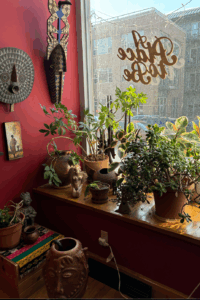
While some attendees witnessed death and dying at a young age, others had never been near it before and craved a new perspective on the subject. Although motives for joining and monthly attendance differ for everyone, the cafe offers a place for sharing ideas, experiences and community. People can find relief in speaking through their own experiences to an open-minded group and addressing fears out loud without judgment, Morrissey said.
“I know people who can’t sleep sometimes because they’re afraid of dying, but they are afraid to say this,” Cheema said. “So, I think people feel, [and] besides being safe, that this is accepted, to come here and be.”
The conversations help take the taboo of death and make it feel more like an acceptable, inevitable part of life, rather than something to fear and avoid. According to Morrissey, no one at the meetings makes her feel bad or morbid for expressing thoughts and fears, and this provides her with a palpable sense of safety, community and relief.
“One thing I wish people knew was how much we laugh. I think people think it’s such a downer, and it’s not,” Morrissey said. “I feel so filled up afterwards, just [with] optimism. There are really kind people in the world, and I just leave with a feeling of love.”
A number ofgroup regulars said that the cafe helped ease fears of aging and death and helped them stay more present in their daily lives.
“I think it really teaches us how to live and how to appreciate the people that we love and appreciate all of life, not take things for granted, not take life for granted,” Morrissey said.
While some of Cheema’s other retired friends don’t understand why she would spend occasional Monday nights talking about death and dying, she believes it is more liberating than depressing.
“And I think it also helps, in just accepting that death is part of the process of life,” Cheema said. “You can’t avoid it. Might as well talk about it and laugh sometimes.”
Learn more about the Madison Death Cafe here, and more about A Place To Be, which also hosts other regular groups, including writing classes and workshops, the Heal the Heart through Forgiveness workshop, Madison Psychedelic Society meetings and nonprofit board meetings, here.
